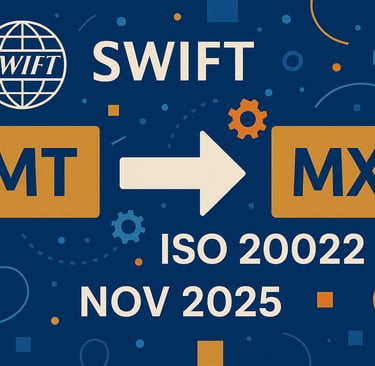What are the Changes to the SWIFT messaging platform as per ISO20022 and its deadline in November 2025?
ISO 20022 is a new global standard for how banks send payment messages, and SWIFT, a major network for international payments, started using it in March 2023. Here’s a simple explanation of the changes in SWIFT’s payment system.
INTERNATIONAL TRADETRADE TRENDSTECHNOLOGYSWIFT PLATFORM
7/4/20252 min read


ISO 20022 is a new global standard for how banks send payment messages, and SWIFT, a major network for international payments, started using it in March 2023.
Here’s a simple explanation of the changes in SWIFT’s payment system:
- What is ISO 20022?
- It’s like a new, universal language for banks to talk to each other about payments.
- Replaces SWIFT’s old messaging system (called MT) with a modern one (called MX).
- Why the Change?
- Old MT messages were like short text messages with limited info, causing confusion or delays.
- ISO 20022 (MX) messages carry more details, like a detailed email, making payments clearer and faster.
- Key Changes in SWIFT Payments:
- Started March 2023: SWIFT began switching to ISO 20022 for cross-border payments.
- Coexistence Period: Until November 2025, banks can use both old MT and new MX messages while transitioning.
- Full Switch by November 2025: After this, all SWIFT payments must use ISO 20022; old MT messages will stop.
- More Data in Messages: MX messages include more info (e.g., full names, addresses, purpose of payment), reducing errors.
- XML Format: Uses a modern, structured format (like a detailed form) instead of the old, less organized text-based MT format.
- Structured Fields: MX messages have 940 specific fields (e.g., for sender, receiver, or tax details), unlike MT’s limited text boxes.
- Benefits for Users:
- Faster Payments: Clearer messages mean fewer delays in cross-border transfers.
- Fewer Errors: Structured data reduces mistakes, like payments going to the wrong account.
- Better Tracking: More details make it easier to trace payments, like following a package.
- Improved Fraud Detection: Extra data helps banks spot suspicious transactions.
- Better Customer Service: Banks can provide more payment details, improving transparency.
- What It Means for Businesses/People:
- Smoother International Payments: Sending money abroad (e.g., to suppliers) will be quicker and more reliable.
- Better Cash Flow: Faster processing helps businesses track money in real-time, aiding planning.
- May Need System Updates: Businesses using bank software might need to update systems by 2025 to handle MX messages.
- Challenges:
- Learning Curve: Banks and businesses need to learn the new system, which can be complex.
- Costly Upgrades: Updating IT systems to handle ISO 20022 can be expensive.
- Testing Needed: Banks must test MX messages to avoid errors, like a missing colon delaying a payment.
